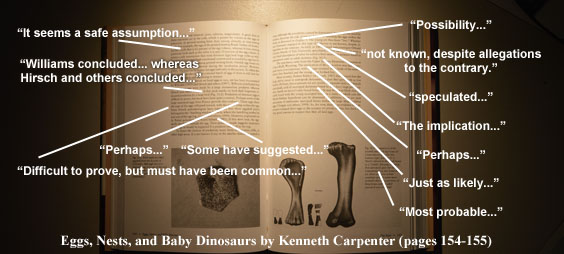The Offer
The offer and website are no longer available. However, the point was made. No one can use the scientific method of hypothesis and experimentation on the past. The scientific method requires direct investigation, such as conducting tests (experiments) that produce repeatable results. No one has yet found a way to do direct investigation of events in the past. Instead of the scientific method (aka operational science), the past is investigated using historical methods.
Historical science results in proofs based on the preponderance of the evidence, as is done in a courtroom trial. However, when investigating ervolution the historical proofs often involve assumptions as their foundational starting points. The results depend on the these initial assumptions. Different assumptions will result in different results.
So how do you know which conclusions about the past are valid?
Assumptions
First, researchers need to use as few assumptions as possible, and preferably none. SEcond, when studying evolution, be sure you understand what assumptions have been used, and in particular the basis for those assumptions. For example, a common assumption used when "proving" evolution is that evolution is true. And, of course, if you start with an assumption that evolution is true the result of your investigation will be that evolution is true. Third, to be honest scientists must be sure they (and you) are aware that there are assumptions, and those assumptions must be documented.
Summary: Researchers must look at the evidence without presuppositions (bias), and determine the most logical conclusion. When the presupposition (assumption) that evolution is true is removed from the evolutionist's equation, the preponderance of the evidence points to Biblical creation.
The museum exhibits include a display of scientific books, such as the one shown above, where you can read the pages yourself.
Probably - Could Have - Possibly - Might Have
When reading scientific papers, books, or literature by evolutionists, look for words that make conclutions conditional. These are words such as, we think, might have, could be, possibly, etc. Most scientists are honest and when writing for an audience of co-workers (other scientists). They recognize they are expressing an opinion about what happened in the past. This is not universally true, but in general conclusions in scientific literature will be correctly presented as conditional. This is not so with most YouTube videos, nor articles or books intended for the general public. In those you will typically find opinions stated as fact.
This is also true for studying creation and the gobal flood. A good example is the Briefly Exposed Diluvial Sediments (BEDS) theory presented earlier on the tour. This is a theory describing the action of flood waters during the global flood. Can we say for sure BEDS is 100% accurate? No. Although it is strongly supported by the evidence, there is no direct observational evidence.
Eyewitness Reports
An eye-witness provides direct observations of what happened. When conducting scientific research, one of the first steps is to do a literature search to learn about previous work and observations. In other words, scientists start with the eye-witness reoprts (usually published papers, but sometimes other types of written materials) of the researchers who came before them. The Bible is the foundational eye-witness report. It was written by men through whom God, the only eye-witness to creation, breathed what was to be recorded. We do have an eye-witness report of creation and the global flood in the Book of Genesis.
Proving Evolution Is Impossible
While it is not possible to scientifically prove evolution happened, it can be shown that the evidence pointing to the impossibility of evolution is overwhelming. What it requires is to demonstrate, based on known natural laws, that the processes necessary for evolution to happen are impossible. This has been done in numerous ways, including genetic entropy, abiogenesis, and the impossibility of protein formation without life already existing.
Next: Trust Jesus, Not Darwin


